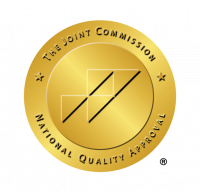Stigma is a powerful and often dangerous force. People who struggle with addiction are often reluctant to reach out for help due to the pervasive stigma that still exists in our society. Instead of being met with support and compassion, individuals are often met with judgment, disappointment, and even disdain.
The statistics on drug and alcohol addiction are staggering. In 2021, more than 106,000 people in the United States died from a drug-involved overdose.1 According to data from the same year, 29.5 million people in the U.S. aged 12 and older have alcohol use disorder (AUD), with only 4.6% receiving any alcohol use treatment in the past year.2

The fact is, alcohol addiction is a medical condition—not a personal failure. Genetics, past trauma, and mental health conditions are all common contributing factors. But sadly, unlike diabetes or heart disease, AUD is often considered something which is avoidable with better self-control.
This harmful misconception prevents many people from seeking help. And as a result, they continue to suffer physically and emotionally, rather than exposing themselves to judgment.
What Is Stigma?
The word “stigma” has its roots in Latin and Greek, originally referring to a tattoo, burn, or similar mark inflicted on a person to signify shame or wrongdoing.3
In contemporary society, the word refers to labeling, stereotyping, and discrimination aimed at people with certain characteristics. Individuals with alcohol use disorder are a common target. For example, we often hear judgmental language used in reference to addiction or treatments for substance use disorder (SUD).
People who struggle with addiction are frequently blamed for the disease, and wrongfully considered to be flawed or morally weak. And this addiction stigma can make needing treatment feel shameful, as many believe it draws attention to the issue.
The unfortunate reality is that the stigma of addiction exceeds that of many other illnesses. Research from Johns Hopkins Bloomberg School of Public Health indicates that people are more likely to possess negative opinions about those struggling with addiction than they are towards those with other mental illnesses.4

Schedule a private call with a Ria Health team member and we can help you get started.
What Causes Addiction Stigma?
So, what causes addiction stigma? A good place to start is understanding the roots of our society’s stigma of alcoholism and addiction, and recognizing how that stigma continues to be reinforced through social pressure, public discussion, and the media.
A lack of understanding and education about the true nature of addiction is one place where stigma has its origin. Not knowing that an SUD is, in fact, a disease of the brain can lead to other assumptions—that a person is intentionally causing harm, or that they are “weak-willed.” Fear of addiction can also motivate some people to push those with substance use disorders to the margins.
The stigma connected to addiction is also reinforced through the imagery we create around it. A perfect example is the way people with addictions are depicted in television and movies—visibly drunk, hungover, getting into fights, and exhibiting other unacceptable behaviors. This leads to the perception that people with substance use disorders are always dangerous, while in reality there are plenty of people with SUDs around us who are “high-functioning,” causing us no harm.
Then, there’s the language we use, which is often intrinsically judgmental. Even though the medical community currently knows much more about addiction and brain chemistry, we continue to hear stigmatizing terms like “drunks” and “addicts,” which tend to reduce people to their addictions. This stigma even filters into the healthcare system—medical doctors are often less equipped to address SUDs than they are other medical conditions.
Why Is Stigma of Addiction Harmful?
The stigma of addiction is harmful because it motivates people to hide their disease, or wait until they hit “rock bottom” to seek help. This includes ignoring warning signs that they may be drinking too much, putting their health, relationships, and jobs at risk. The resulting distress helps perpetuate the cycle of drinking as a coping mechanism.

In addition, stigma can cause people with SUDs to avoid educating themselves about addiction as a disease, leading to further unnecessary shame. They may buy into the stereotypes around people like themselves, further eroding their self-esteem.
Harder To Discuss The Problem
People who face stigma are less likely to tell others they have an addiction or to discuss the details of what they are going through.
They may feel embarrassed or ashamed to discuss the issues they are having. They worry that those they care about will think less of them or shun them. This mindset can make their addiction invisible until it has caused significant damage, or make it difficult to seek out advice or community.
Harder To Seek Support
If people can’t talk about addiction, they are also less likely to seek out help. They may feel ashamed to ask for or look for assistance. Or they may feel they should be strong enough to handle the situation on their own.
Even when someone does offer to help, stigma can prevent those with SUDs from sharing enough about their experience, which can limit access to information or support that matches their needs. For people already in recovery, this hesitancy also increases the likelihood of returning to harmful substance use, as they might feel too embarrassed to reach out in a difficult moment.
Fuels Denial
Stigma also motivates people to deny their addiction, even to themselves. They don’t want to identify as a stigmatized “category of person,” so they pretend the issue doesn’t exist. They tell themselves that as long as they can still hold down a job and live their lives they are “fine.”
By increasing defensiveness and fueling denial, stigma likely makes substance use disorder more pervasive than it would be otherwise.
Read More: Stigma and Alcohol Use: A Recovery Coach’s Perspective
How We Can End the Stigma Around Addiction
Fortunately, there are many things we can do to reduce stigma and improve the status quo. Support, kindness, and empathy can have a significant healing impact when someone is suffering from the disease of addiction and the associated stigma.

Key to this process is recognizing the power of words—choosing language that is encouraging and supportive, rather than shaming. First and foremost, we need to recognize that the person is not their disease and avoid terms like “alcoholic,” instead choosing, “a person with alcohol use disorder.” Person-first language acknowledges the whole individual and doesn’t reduce them to a label.
In addition, we can choose terms like “recurrence” over “relapse,” and “harm reduction” over “getting clean.” The latter terms in these examples depict failure and shame which only serve to reinforce stigma. Conversely, the alternate choices recognize that healing is a gradual process and may have ups and downs.
Finally, educating people about AUD is an essential piece of the puzzle. Helping them understand that alcohol use disorder is a common medical condition rather than a moral failure can greatly alleviate stigma, shame, and negative self-image.
Read more: Why Words Matter: A Look at the Language of Recovery
Addiction is Treatable – Find a Treatment That Works For You
A key part of ending stigma is understanding that addiction is a treatable disease. Having an addiction is not a permanent state (all the more reason to avoid identifying someone as an “addict”).
According to the National Institute on Alcohol Abuse and Alcoholism, lack of knowledge about treatment options can contribute to the stigma. “People may be aware only of treatment options that may be unappealing to them.” A common example is residential treatment, which could interfere with work or home life and be a barrier to confidentiality.5
Although traditional rehab works for some people, there are also options that offer increased flexibility and autonomy. These include support groups, counseling, therapy, and medication-assisted treatment programs. While no single approach works for everyone, many people achieve success with each of these.
In other words, change is possible. The first step is to explore treatment options and choose one that is the right fit—all the while keeping in mind that recovery is a marathon and not a sprint.6
Alcohol Use Disorder Treatment From Home
One way of dealing with the stigma of addiction is to get help remotely. Telehealth gives you convenient access to support for substance use disorder without having to pause your life. Participating in treatment from home, on your own schedule, is discreet and confidential.
Ria Health’s online alcohol treatment program offers members customized treatment plans, weekly coaching meetings, and digital progress-tracking tools from their smartphones. Care plans are tailored to each person’s schedule and individual goals. Learn more about how it works, or get in touch with a compassionate member of our team today.
With less stigma, we can help more people and save more lives!
References[+]
| 1↥ | https://nida.nih.gov/research-topics/trends-statistics/overdose-death-rates |
|---|---|
| 2↥ | https://www.niaaa.nih.gov/alcohols-effects-health/alcohol-topics/alcohol-facts-and-statistics/alcohol-use-disorder-aud-united-states |
| 3↥ | https://www.hopkinsmedicine.org/stigma-of-addiction/ |
| 4↥ | https://www.jhsph.edu/news/news-releases/2014/study-public-feels-more-negative-toward-people-with-drug-addiction-than-those-with-mental-illness.html |
| 5↥ | https://www.niaaa.nih.gov/health-professionals-communities/core-resource-on-alcohol/stigma-overcoming-pervasive-barrier-optimal-care#pub-toc2 |
| 6↥ | https://www.niaaa.nih.gov/health-professionals-communities/core-resource-on-alcohol/support-recovery-its-marathon-not-sprint |




